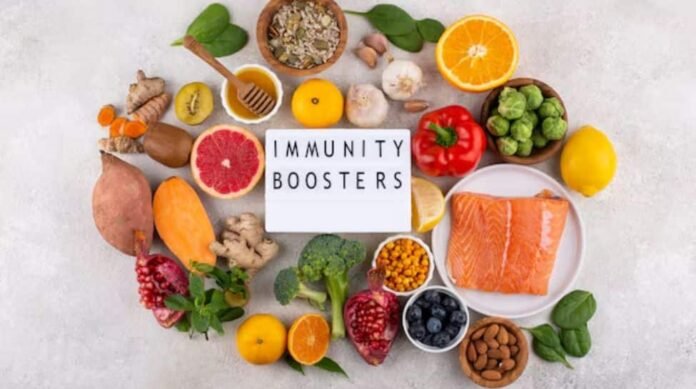The monsoon season brings refreshing rain, cooler weather, and a welcome break from summer heat. But it also comes with an increased risk of infections, especially in children. Lowered immunity, sudden temperature changes, and higher humidity levels make kids more vulnerable to coughs, colds, stomach bugs, and other seasonal illnesses.
To help your child stay healthy during the rainy season, nutrition plays a crucial role. Here’s a list of the best immunity-boosting foods that are perfect for monsoon:
1. Citrus Fruits (Oranges, Lemons, Sweet Lime)
Why: Rich in Vitamin C, which helps fight infections and strengthen immunity.
How to serve: Fresh juices (preferably homemade), slices, or added to salads.
2. Turmeric
Why: Contains curcumin, a powerful antioxidant and anti-inflammatory compound.
How to serve: Add a pinch to warm milk (“golden milk”), dals, or soups.
3. Yogurt and Probiotics
Why: Contains good bacteria that promote gut health, which is directly linked to stronger immunity.
How to serve: Plain yogurt with fruit, smoothies, or raita.
4. Garlic and Ginger
Why: Both are natural antimicrobials and help build resistance against infections.
How to serve: Add to curries, soups, and even warm water with honey and lemon.
5. Seasonal Vegetables (Carrots, Beans, Bottle Gourd)
Why: Packed with essential vitamins, minerals, and antioxidants.
How to serve: Steamed, in soups, or as part of mixed vegetable dishes.
6. Dry Fruits and Nuts (Almonds, Walnuts, Dates)
Why: Rich in vitamin E, omega-3s, and zinc — all crucial for immune health.
How to serve: A handful as snacks or blended into milk and smoothies.
7. Honey
Why: Natural antibacterial and immune-boosting properties.
How to serve: In warm water with lemon, drizzled over porridge, or in herbal teas (for children over 1 year old).
8. Soups and Broths
Why: Easy to digest, hydrating, and packed with nutrients from vegetables and herbs.
How to serve: Add garlic, turmeric, and seasonal veggies for a warming immunity boost.
9. Eggs
Why: A complete protein source and rich in zinc, selenium, and vitamins B6 and B12.
How to serve: Boiled, scrambled, or in pancakes and omelets.
10. Millets and Whole Grains
Why: Rich in fiber, iron, and B vitamins which support energy and immune function.
How to serve: Use millets like ragi, jowar, or bajra in porridge, khichdi, or rotis.
Extra Tips for Parents:
- Keep kids well-hydrated with boiled or filtered water, coconut water, and herbal teas.
- Avoid street food and raw salads during monsoon to reduce the risk of infections.
- Encourage handwashing and hygiene before meals.
- Stick to home-cooked meals as much as possible.


